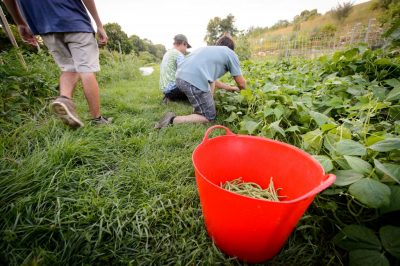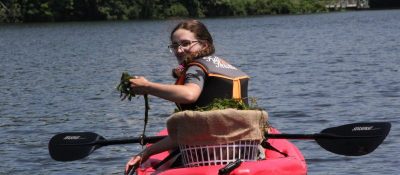Month: January 2021
Connolly Mentioned in Article About Best Cities for Locavores
Towe Awarded Grant to Study Water Quality and Economies
Charles Towe was awarded a grant for $499,930 from the USDA National Institute of Food and Agriculture (NIFA) to study water quality and economics. The grant title is Valuing Rural Stewardship of Riverine Ecosystems: Transfer-Ready Water Quality and Land Cover Co-Benefits, Linked Rural and Urban Economies.
Water quality is the basis for many critical ecosystem services. Runoff of nutrients from the agricultural sector is now the main contributor to the current degradation ofUS waters. Policymakers have found it a challenge to encourage reductions by agriculture for at least two reasons. First, by statute, many agricultural operations are explicitly excluded from regulation. Second, when decision-makers move to set pollution targets it is a challenge to conduct benefit-cost analyses at both the regional and federal levels, exacerbating stasis over the setting of an ambient pollution target that promotes the general welfare.The policy community realizes that estimates of the public value for water quality are critical inputs for robust welfare analyses.Programs for water quality improvement span rural, suburban, and urban communities, and the benefits extend across these same dimensions. To date, much of the focus for water quality changes and benefit calculation has been placed either in urban areas. Given the dominance of non-point sources in our current water pollution portfolio and the fact that the acceptance of, and voluntary participation in, government programs to reduce this pollution is required for further success, a statistically valid and transferable estimate of rural water quality benefits is needed. These estimates are an important input to near-term spending priorities and in the longer term to aid in evaluating the potential for new, perhaps state-level, regulations, or market-based trading mechanisms (environmental markets) to meet water quality targets.Therefore, with the resulting absence of benefits information, it is hard to evaluate an investment in water quality in rural communities and current investment in such areas is likely inadequate. The value of water quality improvement is conditional on the target area of quality-improving management practices and the downstream areas that accrue benefits. Thus, a national or even region-wide assessment of the value of water quality changes with specificity to a local decision-scale is costly. The ecological, land-cover, and social context are critical to value measurement, and comprehensive information requires many valuation studies across a spectrum of locations.Overcoming these challenges requires valuation models that account for social, economic, and environmental context and tradeoffs and are constructed in a fashion that allows estimation of benefits even outside of the studied areas. In this study, we conduct targeted valuation surveys across these dimensions that allow for a benefit estimate of quality improvements along the entirety of the riverine system. These benefit calculations will fill a gap in knowledge and assist policymakers in targeting practice changes that produce the greatest social welfare improvement.
Swallow Awarded Grant to Study Ecosystem Services
Stephen Swallow was awarded a $50,000 grant from the USDA National Institute of Food and Agriculture (NIFA) to study ecosystem services. The grant title is Ecosystem Services Foundations for Resilient Communities: Agriculture, Land Use, Coasts and Energy for Human Well-Being.
The proposed workshop facilitates discussion amongst experts about the impacts of environmental regulations on the local environmental quality and economic well-being of rural communities. We examine the relationship between agriculture, natural resource conservation, policies, and actions that enhance rural community resilience. The workshop addresses best management practices to improve or mitigate changes in ecosystem services. We focus on rural and rural-fringe community’s efforts that adapt to changing frequencies and magnitudes of natural storms, by creating resilience for built infrastructure in consort with resilient provisions of the ecosystem. The research workshop builds upon a long history of successful annual workshops addressing related themes in natural resource, environmental and agricultural economics and policy. The targeted focus of the workshop is designed to promote in-depth dialogue, debate and policy discussions among a small group of invited speakers, selected presenters and other attendees, with session coordinators chosen for their expertise and relevance of ongoing work. The workshop also follows a plan for dissemination and publishing of research and policy discussion. It enables attendees to learn about and evaluate recent advances in theoretical and empirical research in the area of ecosystem services foundations for resilient communities. The meeting also provides participants a venue to present the policy significance of their work and convey their data needs to relevant agencies. This approach benefits the scientific community as research findings are published in a special issue. Moreover, the workshop informs a wide range of groups, including rural community advocates, environmental advocacy groups, local businesses and technology companies, national and local policymakers, and others.
Connecticut Sea Grant Coastal and Marine Economics Graduate Fellowship Program 2021-22
‘Learn by Doing’: Journalism, ARE Departments Team Up for New Dual Degree
 UConn’s Department of Journalism and Department of Agricultural and Resource Economics (ARE) have worked together to develop a dual-degree program that allows students to simultaneously complete with a bachelor of arts in journalism and a bachelor of science in ARE. The dual degree was created in response to requests from journalism students interested in pursuing ARE as an additional area of study. The new program allows students to gain experience in applying journalistic perspective to economics, the environment, and related policy.
UConn’s Department of Journalism and Department of Agricultural and Resource Economics (ARE) have worked together to develop a dual-degree program that allows students to simultaneously complete with a bachelor of arts in journalism and a bachelor of science in ARE. The dual degree was created in response to requests from journalism students interested in pursuing ARE as an additional area of study. The new program allows students to gain experience in applying journalistic perspective to economics, the environment, and related policy.
Emma Bojinova, a lecturer in ARE, and Maureen Croteau, professor and head of the Department of Journalism, worked together to formalize a plan of study for the program that allows completion of both degrees in four years while leaving room for electives and the fulfillment of all general education requirements. The dual degree requires eighteen additional credits beyond a single bachelor’s degree, which can be completed during the summer or winter intercessions, or by taking additional courses during fall and spring semesters. To ensure that they’re on track for graduation, students will receive specialized advising from members both departments. With careful planning, courses in both disciplines can be used to satisfy multiple requirements. Read more.
Previous Stories
Chris Laughton (MS ARE), Professor Rigoberto Lopez and ARE undergraduate student Avery Bikerman complete an analysis of the Impact of COVID-19 on the Connecticut Dairy Farm Sector for the Zwick Center on Food and Resource Policy. See the fact sheet CT Dairy-COVID-Factsheet-FINAL.pdf .pdf and outreach Report Covid-19-Dairy-Zwick report 67-FINAL.pdf..pdf
Associate Professor Nathan Fiala and co-author Mahesh Dahal published research earlier this year in World Development where they showed that current literature about microfinance is statistically under-powered and flawed. Read more on UConn Today.
New NBER Working Paper.pdf by Professor Sandro Steinbach focuses on the impacts of retaliatory tariffs on agriculture.
Professor Sandro Steinbach and Professor Colin Carter from the University of California Davis are creating tools that measure the effects retaliatory trade policies on U.S. agricultural exports. The researchers received a $485,000 grant from the Department of Agriculture’s National Institute of Food and Agriculture to study more than 8,000 impacted commodities.
Got Allergies? Have a beetle! Professor Sandro Steinbach co-lead a multidisciplinary team that measured the healthcare costs of common ragweed’s European invasion, and the countervailing impact of a second invasive species – the leaf beetle. “Assessing the human health impacts of invasive alien species is a difficult task; it requires collaboration among scientists from different disciplines, including plant and insect ecology, aerobiology, medicine, and economics.” says Steinbach. Read more about this story in UConn Today.
Professor Sandro Steinbach finds that California’s wine, walnuts, oranges, and table grapes were the export commodities most affected by tariffs imposed as part of the US-China trade war. Since the beginning of the trade war, China has taken advantage of the opportunity to continue diversifying its agricultural supply chains. Read more about this topic.
Professor Nathan Fiala and PhD student Alicia Barriga publish results of their research that show ho mismanagement and inadequate infrastructure pose a significant problem for Ugandan farmers.
Professor Richard Dunn is interviewed by ABC News about his research on death rates and economic turndowns.
Professor Bob Pomeroy‘s work is combating illegal fishing to strengthen maritime security and environmental sustainability
The Zwick Center releases a new study that quantifies Connecticut green industry’s economic impact.
Dr. Sandro Steinbach receives funding to develop tools to understand trade war effects on agriculture industry.
The Zwick Center releases reports showing the impacts of Connecticut’s agricultural industries.
Kimberly Rollins appointed head of Agricultural and Resource Economics.
Rebecca Boehm published an article in the Leonardo Dicaprio Foundation website discussing U.S. household food purchasing and the large part it plays in contributing to greenhouse gas emissions.
Assistant Professor Sandro Steinbach, the newest faculty member of the Department of Agricultural and Resource Economics, was featured in Naturally@UConn.
Shaina Stamp, a CAHNR student studying in a summer program abroad at the Mediterranean Agribusiness School in Spain, was awarded the best final project presentation in her class for her marketing and communications.
ARE student Risa Lewis was selected for COP24 by a 12-member UConn@COP Organizing Committee. COP24 is the acronym for the 24th Conference of the Parties to the United Nations Framework Convention on Climate Change (UNFCCC). Previous conferences in Bonn, Germany and Paris, France. This year’s event will take place from December 3-14, 2018, in Katowice, Poland.
Rebecca Boehm was cited in The Washington Post in an article published on Monday, June 11th, 2018, in an article entitled: The U.S. Diet is a Climate Disaster. Here are Four Easy Fixes. The article is about average American household diets, and how consumers can make changes in personal lifestyle habits to help limit the greenhouse gas emissions caused by food production and transportation, with suggestions and research by Boehm. The full article can be found here. She was also cited in another article in Daily Science.
The Zwick Center for Food and Resource Policy invites you to the release of latest numbers on the contribution of agricultural sectors to the Connecticut economy, including statewide sales, jobs, wages, and non-traditional impacts. Comparisons to the 2010 study, identifying rising and declining sectors.
Please see the latest report here.
 The Connecticut Sea Grant Coastal and Marine Economics Graduate Fellowship Program
The Connecticut Sea Grant Coastal and Marine Economics Graduate Fellowship Program